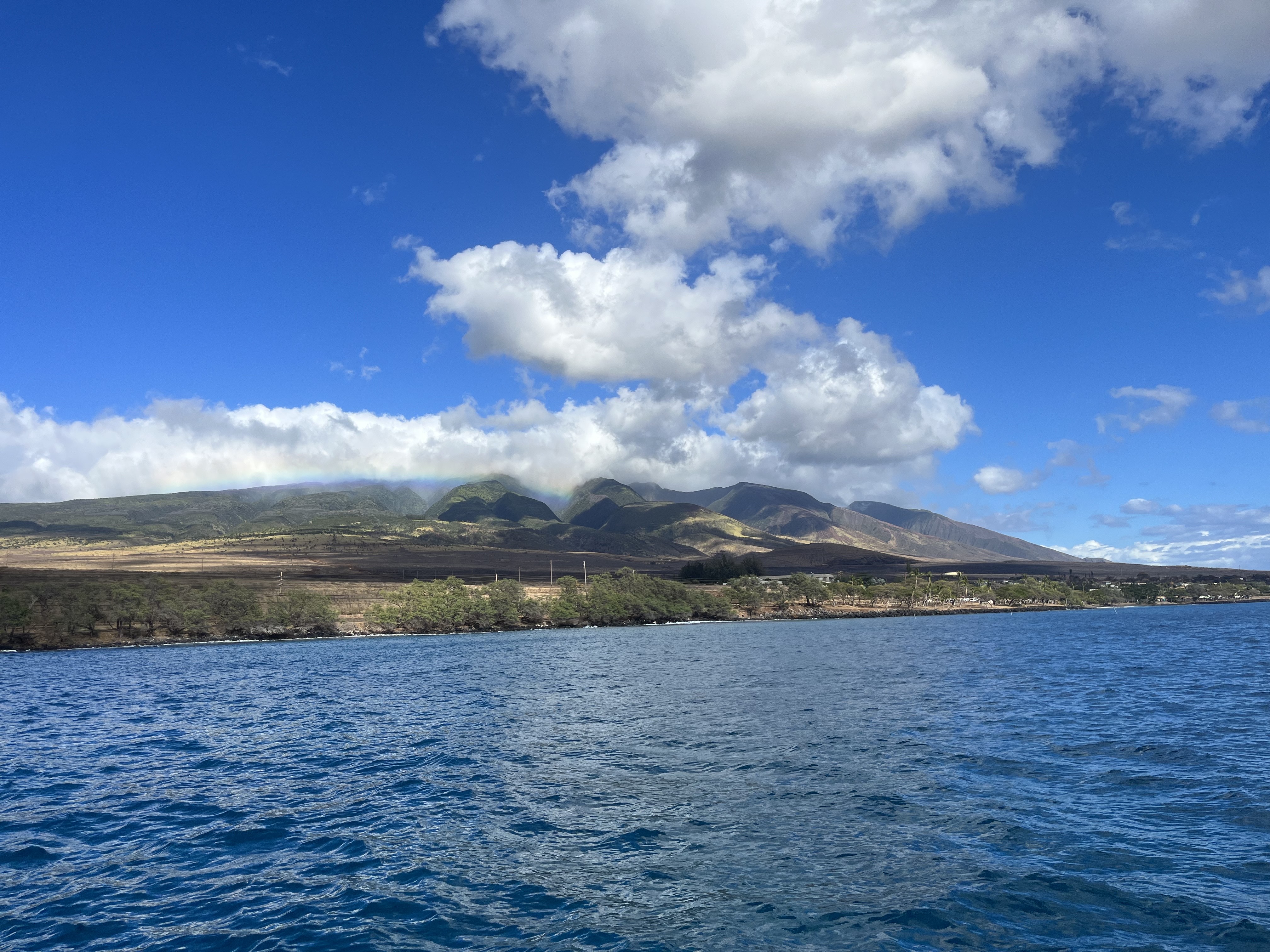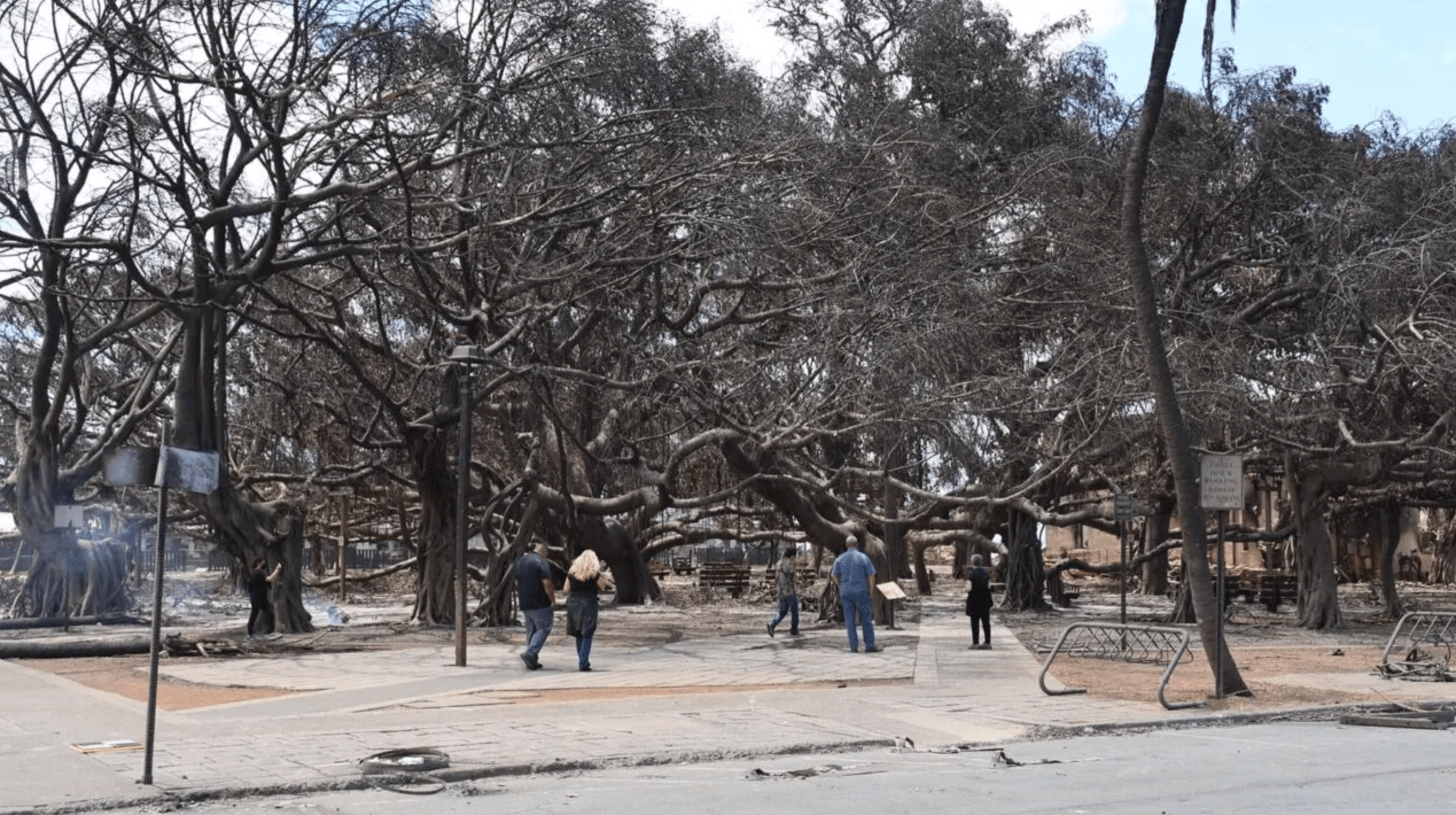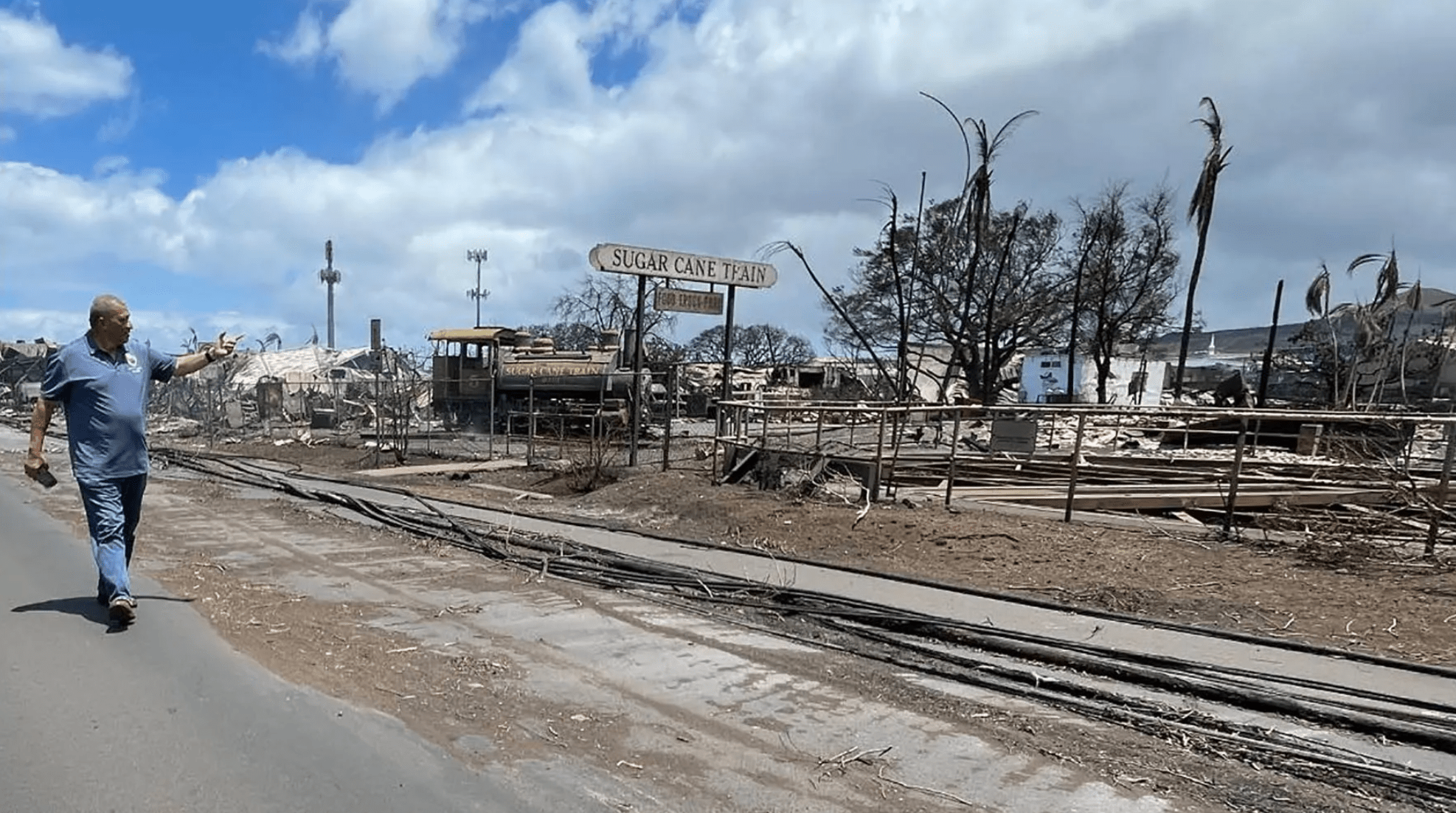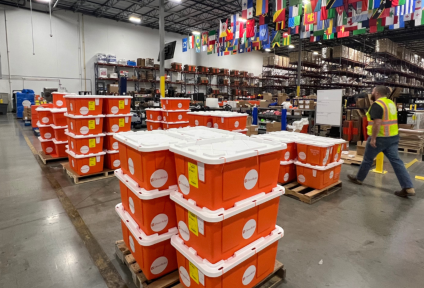Santa Barbara–Born Maui Resident Among Volunteers Helping Those Displaced by Deadly Wildfires
As Death Toll Rises and Search Continues for Hundreds Still Missing, Residents of Hawaiian Island Deliver Supplies to Lahaina

With a death toll of 96 and rising and potentially 1,000 more people missing, the wildfires on the Hawaiian island of Maui that destroyed the historic town of Lahaina are the deadliest in more than a century of U.S. history. Countless homes and acres of the island (including conservation areas) have been reduced to ash, and numerous people are still searching for their loved ones.
“This is the largest natural disaster we’ve ever experienced,” Hawai‘i Governor Josh Green told journalists on Saturday, four days after the fires started on Tuesday, August 8. He later told the press that the flames were traveling at a mile a minute, due to high winds from Hurricane Dora and drought conditions. “It’s going to be a natural disaster that’s going to take an incredible amount of time to recover from.”
The fires began miles apart, at different times that morning. As of Monday morning, the Lahaina Fire is 85 percent contained, the Upcountry-Kula Fire, which ignited first, is 60 percent contained, and the Pulehu-Kihei Fire remains 100 percent contained but not yet extinguished. An official cause of the fires has not yet been determined, but a local couple filed a lawsuit against Hawai‘i’s main electric provider that alleges their active powerlines were blown over and ignited the flames.

In addition, the state of Hawai‘i has launched a formal review of its emergency disaster response, including the response from officials, which has been questioned by Maui residents.
Many Maui residents who are not in recovery from the enormous blazes that swept through the island and left hundreds homeless are volunteering their time and money to help those displaced by the fires. Among those volunteers is Santa Barbara native Sara Peyton, who grew up in Toro Canyon and has lived and worked in Maui for four years alongside family members who have resided there for decades. After graduating from UC San Diego with a degree in environmental science and a minor in marine science, she got a job working at Haleakalā National Park, before accepting a position as a marine naturalist in Maalaea.
“Coconut wireless, which is what we call the gossip here, or just talking in-between people, says it [the death toll] is going to be somewhere between 500 and 1,000 deaths,” Peyton estimated, considering the massive destruction in Lahaina and slow response from the state.
On Sunday, Peyton volunteered with a group of residents to deliver supplies on a snorkel charter boat to Lahaina.
“It’s a good problem when you have a giant outpouring of support, everybody wants to help, and there are not enough tasks at each site to go around,” Peyton said. “So it was nice to be able to get on a boat and transport supplies directly to the West Side.”

Once she returned home, she shared her experience with the Independent, before checking in on her aunt. Peyton said her great-uncle was last seen standing on his roof in Lahaina, fighting to save his home with a hose against the flames burning beneath his feet.
“Everyone is in mourning,” Peyton said. “It’s the only thing on anyone’s mind right now. Maui’s a small community; that’s why we’re all so close-knit and working together. For pretty much everyone who lives here, you’re only one or two or three degrees away from every other person on this island. Everyone is, like, your co-worker’s best friend’s brother or, like, your cousin’s friend’s baby-daddy.”
Despite the recent tragedies on the island, Peyton said volunteering was an uplifting experience, and people were in good spirits. They did two runs to the West Side, with volunteers passing bag after bag of supplies in an assembly line to get everything on the boat. Their arms were carrying loads of basic essentials, such as fuel, tents, water, food, and a suitcase packed with Monster energy drinks.
The operation took a lot of people, and multiple trips — including a jet ski that met them halfway on their second run, with a paddleboard attached to the back to cart supplies to and from the shore. By the end of it all, Peyton was salty and drenched.
“Some of the supplies we did bring over to the West Side were some fat cases of beer,” she continued. “Every single person who lives on this island wants to help out, and so they’ve got a lot of donations of food, water, camping supplies, baby stuff, medical stuff.
“But you know what people forget about? Things like beer. That is also absolutely required to get through a disaster like this. You need some extra joy and normalcy in your life.”

Peyton had to evacuate from her home in Kihei for one night due to the Pulehu-Kihei fire that raced toward her neighborhood from the mountains. However, after hopping between friends’ and coworkers’ houses trying to outrun the fire and evacuation orders that night, she was able to return to her home and work the next day.
There are only 10 fire stations on the island of Maui, and between Maui and the nearby islands of Molokai and Lanai, there are typically only 60 to 70 county firefighters working out of those stations at one time. For comparison, Santa Barbara County has 48 total fire stations across the region, and can call on help from other fire agencies across the state if needed.
As three fires burned across three different areas of the island, Peyton’s neighbors on the adjacent street of Kaiwahine decided to take action.
“It almost reached the houses. The people who lived on that street grabbed f*ckin’ hoses,” Peyton said. “They grabbed, like, any tools or machinery they had and fought back the fire themselves because they were faster than the fire department.”
Fortunately, almost all of Peyton’s close friends on the island were unaffected. However, friends of Peyton who had homes in Lahaina have been forced to take up temporary residences on friend’s couches, and some of her friends are still living in unsafe water zones, where they can’t use the water from their pipes.
“I’m okay. I’m grateful and also guilty that my home is safe, my work is safe, and all the people that I am closest with are safe and in the same boat as me, where they still have a home and a job,” Peyton said.
The Independent’s own Matt Kettmann is on the island with his family, visiting his cousin in Makawao. The upcountry fire is somewhat nearby, he said, but not a direct threat to where he is. As people continue to be displaced from their homes, hotels are using their accommodations to house families who have nowhere to go. Kettmann’s room at the bed and breakfast they booked was given to a family of eight who had been evacuated, so he got a smaller room at a reduced price. All of the island’s East Side attractions seemed less busy or mellower than usual, he said.
Sign up for Indy Today to receive fresh news from Independent.com, in your inbox, every morning.
Like many other island residents working in Maui’s tourism industry, Peyton said she feels stuck between a rock and a hard place, considering both the state of the island’s communities and the many businesses that rely on tourists, including her job and the snorkel charter boat that transported supplies and volunteers on Sunday.
“They had a snorkel tour in the morning,” Peyton said. “Once they finished that, they unloaded their tourists off of the boat and then reloaded the boat with all the supplies. Kind of a whiplash moment — you’re taking these people out to go snorkeling all morning, and then it’s like, okay, instead of an afternoon charter, we’re doing this.”
Despite her gratitude for her workplace staying open and being able to keep her job — since many others across the island had their jobs burn down, among the more than 2,000 structures destroyed and losses estimated around $6 billion —- she said working and interacting with tourists feels somewhat weird. But at the same time, she admitted she loves her job and recognizes tourism’s role in her and other workers’ livelihoods.
“You feel as if the people who are coming here are trying to vacation in a warzone at a moment where every single person that is serving them is just absolutely devastated and heartbroken for their community and has to put on that happy face,” Peyton explained. “There’s that disconnection for a lot of the tourists where it’s like, it’s not their Ohana, it’s not their family here, and not their land here that has been decimated.”
Peyton was not in Santa Barbara when the 2017 Thomas Fire ignited and forced many people out of their homes. While clarifying that she doesn’t want to compare tragedies, she said that the feelings within the Santa Barbara community then and the Maui community now are probably not so different. It’s scary and difficult to watch the place you call home be destroyed, she said.
“The problem with any natural disasters out here, though, is we are isolated. Like, if the Costco down the street is out of supplies, and out of water and toilet paper, you can just drive to the one a couple of hours away,” Peyton said. “For us, there is no store a couple of hours away. You’d have to wait for the next boat shipment to get here.”

From the Central Coast, Santa Barbara–based charity Direct Relief is mobilizing assistance to those in need in Maui, delivering medical supplies, hygiene products, and lifesaving equipment, as well as working directly with health-care providers and emergency responders to offer supplies and support for the injured and those suffering from smoke-related health issues.
Federal and state emergency responders have been increasing their presence on the island, and federal disaster assistance has been made available to the state of Hawai‘i to supplement local recovery efforts on the islands, according to FEMA.
“The firefighters in Maui County are to be commended for their heroic firefighting efforts,” said U.S. Fire Administrator Dr. Lori Moore-Merrell. “As the fire quickly outpaced suppression efforts, they kept fighting even as many of them lost their homes. As I talk with them during our station visits, they are extremely passionate about remaining on duty, while being encouraged to take appropriate rest for their own physical and mental well-being.”
It’s the Maui community itself that has been putting in the legwork to organize support and help their communities as quickly as possible. Peyton is currently in the process of applying to be a Red Cross volunteer — which has four Central Coast volunteers among the team in Maui to assist with relief efforts — but everything she has done so far has been through the hard work and care of the community around her. She said the best thing to do now is to donate directly to families in need or to trusted, community-led fundraisers.
You can find a verified list of families in need here or donate to the Council for Native Hawaiian Advancement here. To donate to Direct Relief’s Hawai’i Fire Relief fund, click here. For more information on the Hawai’i wildfires, visit FEMA.gov.




You must be logged in to post a comment.